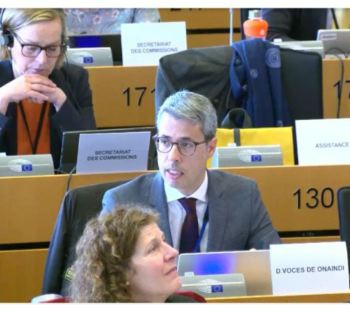|

Daniel Voces in public hearing 'finning and shark trade'
The fishing sector defends before the EP the legal and sustainable fishery and trade of sharks
 EUROPEAN UNION EUROPEAN UNION
Wednesday, March 29, 2023, 07:00 (GMT + 9)
- Europêche recalls that the EU fleet has never practiced and has always condemned the practice of “finning” – cutting the fins on board and throwing the bodies overboard – by any fleet in the world
- The ban would have serious consequences for our economies and consumers, and Asia would resort to fleets that operate with lower standards to meet their demand
The European fishing sector, represented by Europêche, an organization in which CEPESCA is integrated, appeared yesterday before the European Parliament (EP) to participate in the public hearing on the citizen initiative 'Stop finning, Stop the trade', referring to shark fishing, more specifically to the capture and sale of shark fins.
.jpeg) In his presentation, Daniel Voces, Director General of Europêche, took the opportunity to report on European fishing for these species, clarify concepts and recall that the European Union fleet unanimously condemns the practice of "finning" (cutting shark fins and throw mutilated bodies into the sea) by any fleet in the world. In fact, as Voces pointed out in his speech, the EU fleet has never practiced "finning", as evidenced by the fact that it has not committed any offense or received any sanction for this practice. “We value, trade and eat shark meat, a species from which everything is used. In fact, in all Regional Fisheries Management Organizations (RFMOs), "finning" is strictly prohibited. This is also the mandate given by the UN to all countries”, affirmed the general director of Europêche.
To guarantee the sustainable management of sharks, their fisheries are meticulously regulated by the different countries in their jurisdictional waters and by the RFMOs in all oceans. In addition, as Voces explained, there are many legally binding international instruments that regulate fishing from a biological, environmental and control point of view.
As regards finning control, since 2013 all EU vessels must comply with the policy of fins attached to shark landings, that is, all European vessels must unload their shark catches with the fins attached to the body. This EU rule should be respected by all fleets in the world. In addition, the widely ratified Agreement on Port State Measures requires the verification and inspection of fishing vessels entering ports to ensure that they comply with the Law. And as if this were not enough, Voces pointed out at the meeting Once the specimens have been landed, the national authorities must issue a catch certificate that will accompany the body of the shark and its fins until they reach the consumer. In this sense, it can be said that the EU has the most advanced policy to prosecute and combat illegal fishing (IUU) of sharks.
.jpg)
As for the blue shark or blue shark, it is the species of shark with the largest geographical distribution and rapid growth. The latest scientific information shows that the population of this species is abundant and healthy in all oceans. Its fin is easily distinguishable, even separated from the body, due to its characteristic metallic blue coloration, the lack of spines at the base, and other factors. Therefore, fishery inspectors, and also traders, can easily make a visual identification.
Most of the shark catches of the European fleet in all oceans are transported to Vigo (Spain) where the fin is finally separated from the body. The meat is sold in many EU countries, in South America, Russia and Ukraine (before the invasion). The fins are shipped to Asian countries and the United States.
.png)
According to the FAO, the more restrictive market regulations in the different states have led to a reduction in the trade in shark fins. Thus, for example, sales of shortfin mako fins have decreased by 50% since 2003. And, in any case, as Voces explained, shark fishing would not be profitable without the sale of the bodies. The income obtained by the fishermen for their commercialization represents around 60% of the total, the remaining 40% comes from the sale of the fins. Keep in mind that the fins only account for 5% of the total weight of the shark.
After providing these and other clarifications about the European shark fishery, Voces reported on the impact of the measures proposed by this initiative: it would mean prohibiting a perfectly legal and sustainable economic activity in Europe, it would generate serious consequences for our economies (especially for that of Galicia) and consumers both in Europe and Asia, would force us to transfer the processing and trade of our catches to non-EU countries, and Asian demand would have to be met with fins from other fleets that operate with lower standards.
The director general of Europêche concluded by stating that the ban is not justified and is not an option, and proposed to promote science, management, control, application, traceability and cooperation between countries and administrations, in addition to better implementing policies because “there is always room for improvement”.
Source: BDI Comunica
|
|



